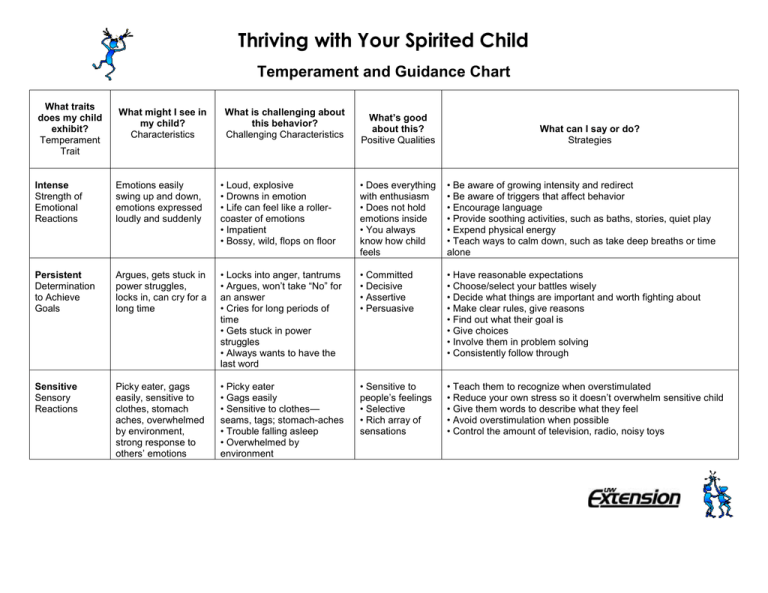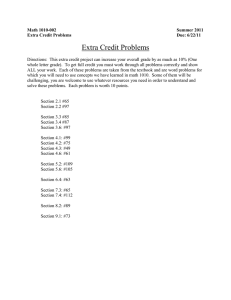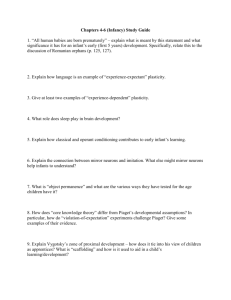Thriving with Your Spirited Child Temperament and Guidance Chart
advertisement

Thriving with Your Spirited Child Temperament and Guidance Chart What traits does my child exhibit? Temperament Trait What might I see in my child? Characteristics What is challenging about this behavior? Challenging Characteristics What’s good about this? Positive Qualities What can I say or do? Strategies Intense Strength of Emotional Reactions Emotions easily swing up and down, emotions expressed loudly and suddenly • Loud, explosive • Drowns in emotion • Life can feel like a rollercoaster of emotions • Impatient • Bossy, wild, flops on floor • Does everything with enthusiasm • Does not hold emotions inside • You always know how child feels • Be aware of growing intensity and redirect • Be aware of triggers that affect behavior • Encourage language • Provide soothing activities, such as baths, stories, quiet play • Expend physical energy • Teach ways to calm down, such as take deep breaths or time alone Persistent Determination to Achieve Goals Argues, gets stuck in power struggles, locks in, can cry for a long time • Locks into anger, tantrums • Argues, won’t take “No” for an answer • Cries for long periods of time • Gets stuck in power struggles • Always wants to have the last word • Committed • Decisive • Assertive • Persuasive • Have reasonable expectations • Choose/select your battles wisely • Decide what things are important and worth fighting about • Make clear rules, give reasons • Find out what their goal is • Give choices • Involve them in problem solving • Consistently follow through Sensitive Sensory Reactions Picky eater, gags easily, sensitive to clothes, stomach aches, overwhelmed by environment, strong response to others’ emotions • Picky eater • Gags easily • Sensitive to clothes— seams, tags; stomach-aches • Trouble falling asleep • Overwhelmed by environment • Sensitive to people’s feelings • Selective • Rich array of sensations • Teach them to recognize when overstimulated • Reduce your own stress so it doesn’t overwhelm sensitive child • Give them words to describe what they feel • Avoid overstimulation when possible • Control the amount of television, radio, noisy toys Thriving with Your Spirited Child What traits does my child exhibit? Temperament Trait What might I see in my child? Characteristics What is challenging about this behavior? Challenging Characteristics What’s good about this? Positive Qualities Perceptive Insights and Understanding Senses are keen, easily stimulated, is aware of feelings and perceives what others miss, notices everything • Distracted by minor intrusions • Difficulty with decision-making • Difficulty finishing things • Doesn’t want to miss out on anything • Doesn’t want to go to sleep • Creative, imaginative • Detail-oriented • Notices everything • Bright • Sense of humor • Make sure you have their attention—touch lightly, make eye contact • Keep message simple • Tell them what they can do • Limit the number of instructions given at one time • Allow time to finish tasks • Provide quiet places to work and play • Establish predictable routines Ability to Adapt Ability to Adapt to Changes and Transitions Protests changes in activities or routines, upset by surprises • Beginning and ending activities are stressful • Always needs to know what to expect • Fears the unknown • Rigid, not able to shift patterns • Upset by surprises • Notices minor changes in foods, clothes, places • Organized (in own way) • Likes routine • Cautious checks things out before acting • Establish routines • Explain plans for the day • Be patient with all of their questions about what will happen • Allow time to warm to new situations • Give warnings before changing activities • Needs time to adjust to changes • Give them the words to describe, “Change is difficult.” Rhythm Predictability of Bodily Functions No schedule or routine, every day is different, sudden mood changes • Not hungry or tired at the same time • Irregular elimination schedule • Wakes at night • Moods change suddenly • Uncooperative • Loner • Flexible • Full of surprises • Will be good at jobs with crazy hours • Provide routine and schedule that is consistent so they can adapt gradually • Teach self-help skills for more independence • Separate meal time from eating time—put plate in refrigerator to eat when hungry • Separate bed time from sleep time—if not sleepy acknowledge, but indicate it is time to be in our bedroom What can I say or do? Strategies Thriving with Your Spirited Child What traits does my child exhibit? Temperament Trait What might I see in my child? Characteristics What is challenging about this behavior? Challenging Characteristics What’s good about this? Positive Qualities What can I say or do? Strategies Active Activity/Energy Needs Body is in constant motion, even if sitting, needs to move to feel good • Moves constantly • Cannot sit still • Moves all over bed • Can be easily overstimulated • Can be challenging to keep safe • Interrupts • Wild • Destructive • Uncontrolled • Uses whole body to communicate or feel • Energetic • Moves to feel good Not passive • Has many interests • Provide opportunities to run, jump, climb • Avoid long periods of sitting • If they have to sit quietly, keep it short and follow with active play • Bring things to do when sitting is required • When sitting, don’t expect all body parts to be still • Intervene early • Provide opportunity for extracurricular activities, after school • Needs physical release • Provide quiet distraction • Provide cooling off time/space, space for blowing off steam First ReactionWithdrawal Reaction to New Experiences and Things Withdraws or avoids things at first, needs time to observe, extremely distressed by the unfamiliar • Immediately says “No” to new food, new clothes, new experiences • Physical reaction – blood pressure rises, tenseness • Day care, babysitters, school will be difficult transitions • Cautious, checks things out first • Won’t run off in public • Often likes to be at home • Explain what will happen ahead of time • Visit new places ahead of time • Arrive early for gradual adjustment • Stay with them, gradually separate • Bring security items • Teach techniques for being calm • Help them express concerns in words • Encourage them to ask for what they need • Provide lots of opportunities to practice Mood Overall Disposition More serious, overanalyzes, cries or whines easily, first reaction is negative • Doesn’t see the positive side of things • Appears cranky or serious • Complains, whines, pouts, sulks, gripes • Never satisfied, over-analyzes • Good suggestions • Good evaluator • Thinks deeply • Analytical • Ask them what they enjoyed about a situation • Break situations into parts to avoid one general statement • Appreciate their suggestions • Keep your reaction neutral • Give time to adjust or get on with life • Recognize it is not a personal attack on your ideas Modified from the following sources of information: Family Information Services, Minneapolis, MN, Sept 2001, and Management Techniques for Parenting Children with Difficult Traits, http://www.elainegibson.net/parenting/mgt.html Developed by Nan Baumgartner 4/4/02

